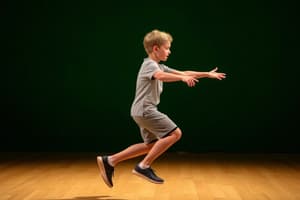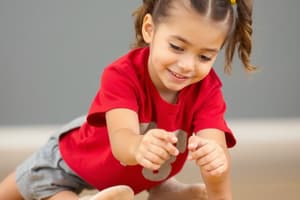Podcast
Questions and Answers
What does a retention test primarily assess?
What does a retention test primarily assess?
- The adaptability of a skill in novel contexts
- The effectiveness of augmented feedback in practice
- The long-term persistence of a learned skill (correct)
- The individual’s performance level under stress
How does a transfer test differ from a retention test?
How does a transfer test differ from a retention test?
- It assesses the impact of external factors on performance.
- It evaluates performance in a different context or variation of the skill. (correct)
- It focuses solely on the time taken to perform the skill.
- It measures the same skill practiced before.
Which of the following best describes the concept of stability in learning assessments?
Which of the following best describes the concept of stability in learning assessments?
- The ability to perform consistently under identical conditions
- The maintenance of performance levels across multiple trials
- The temporary achievement of a high performance level
- The adaptation to different environments or variations of the skill (correct)
What is a key indicator that an individual has genuinely learned a motor skill?
What is a key indicator that an individual has genuinely learned a motor skill?
What can performance plateaus indicate regarding motor skill learning?
What can performance plateaus indicate regarding motor skill learning?
What is the primary consideration when determining the effectiveness of skill instruction?
What is the primary consideration when determining the effectiveness of skill instruction?
Which of the following factors affects the information-processing stages in motor performance?
Which of the following factors affects the information-processing stages in motor performance?
What type of feedback is crucial for learners to improve their skills?
What type of feedback is crucial for learners to improve their skills?
In the context of skill instruction, why is it important to understand the target skill?
In the context of skill instruction, why is it important to understand the target skill?
How do learners' backgrounds (e.g., child, athlete, senior citizen) impact skill instruction?
How do learners' backgrounds (e.g., child, athlete, senior citizen) impact skill instruction?
Which of the following describes a condition that enhances feedback-based adjustments in movements?
Which of the following describes a condition that enhances feedback-based adjustments in movements?
What aspect related to the target skill should be assessed for effective skill instruction?
What aspect related to the target skill should be assessed for effective skill instruction?
What is the expected outcome of effective skill instruction?
What is the expected outcome of effective skill instruction?
In what way does task demand affect instruction?
In what way does task demand affect instruction?
Which of the following best describes a potential gap in skill instruction?
Which of the following best describes a potential gap in skill instruction?
What is the primary consideration when enhancing feedback-based adjustments in motor performance?
What is the primary consideration when enhancing feedback-based adjustments in motor performance?
Which factor is least important when determining effective skill instruction?
Which factor is least important when determining effective skill instruction?
What does a retention test evaluate in motor skill learning?
What does a retention test evaluate in motor skill learning?
When considering skill instruction, why is the understanding of the learner's background critical?
When considering skill instruction, why is the understanding of the learner's background critical?
For which type of skill is massed practice likely to be more effective?
For which type of skill is massed practice likely to be more effective?
How do transfer tests contribute to understanding motor skill learning?
How do transfer tests contribute to understanding motor skill learning?
Which aspect does stability assess in the context of coordination dynamics?
Which aspect does stability assess in the context of coordination dynamics?
What characteristic of the intertrial interval is most relevant for discrete motor skills?
What characteristic of the intertrial interval is most relevant for discrete motor skills?
What misconception may arise from performance plateaus in skill learning?
What misconception may arise from performance plateaus in skill learning?
Which factor is NOT typically assessed when determining the stability of motor skill learning?
Which factor is NOT typically assessed when determining the stability of motor skill learning?
A retention test evaluates how well a learner can perform a practiced skill after a significant amount of time has passed.
A retention test evaluates how well a learner can perform a practiced skill after a significant amount of time has passed.
Transfer tests assess a learner's ability to perform a practiced skill exactly as it was taught in different contexts.
Transfer tests assess a learner's ability to perform a practiced skill exactly as it was taught in different contexts.
The presence of performance plateaus during skill practice indicates that no learning has taken place.
The presence of performance plateaus during skill practice indicates that no learning has taken place.
A person performing well in a clinic setting is a strong indicator of their overall motor skill learning ability.
A person performing well in a clinic setting is a strong indicator of their overall motor skill learning ability.
Stability in performing a skill is assessed through analyzing the coordination dynamics involved in that performance.
Stability in performing a skill is assessed through analyzing the coordination dynamics involved in that performance.
Flashcards
Retention Test
Retention Test
A test that measures how well a person remembers and performs a practiced skill after a period of not practicing.
Transfer Test
Transfer Test
A test that assesses a person's ability to adapt a practiced skill to a new context or variation.
Persistence Characteristic
Persistence Characteristic
The tendency for improvements in a motor skill to persist over time, even without practice.
Adaptability Aspect
Adaptability Aspect
Signup and view all the flashcards
Performance Plateau
Performance Plateau
Signup and view all the flashcards
Distributed Practice
Distributed Practice
Signup and view all the flashcards
Massed Practice
Massed Practice
Signup and view all the flashcards
Intertrial Interval
Intertrial Interval
Signup and view all the flashcards
Continuous Skills
Continuous Skills
Signup and view all the flashcards
Discrete Skills
Discrete Skills
Signup and view all the flashcards
Massed Practice Schedule (Discrete Skills)
Massed Practice Schedule (Discrete Skills)
Signup and view all the flashcards
Distributed Practice Schedule (Discrete Skills)
Distributed Practice Schedule (Discrete Skills)
Signup and view all the flashcards
Conceptual Model of Motor Performance
Conceptual Model of Motor Performance
Signup and view all the flashcards
Feedback-based Adjustments
Feedback-based Adjustments
Signup and view all the flashcards
Extrinsic Feedback
Extrinsic Feedback
Signup and view all the flashcards
Coordination Stability
Coordination Stability
Signup and view all the flashcards
Performance Consistency
Performance Consistency
Signup and view all the flashcards
Performance Variable
Performance Variable
Signup and view all the flashcards
Study Notes
Reading 1 - Defining/Assessing Learning
- Performance: The behavioral act of executing a skill at a specific time and in a specific situation. It is observable.
- Learning: A change in the capability/potential to perform a skill, inferred from a relatively permanent improvement in performance resulting from practice or experience. It is not directly observable.
- Performance Variables: Factors influencing performance, like alertness, anxiety, setting uniqueness, and fatigue.
- 5 Performance Characteristics for Skill Learning:
- Improvement: Skill level increases over time.
- Consistency: Performance becomes more similar across attempts as learning progresses.
- Stability: Performance's resistance to internal or external factors (e.g., stress, obstacles).
- Persistence: Improved performance capability lasts over time.
- Adaptability: Ability to perform the skill successfully in changed situations increases with learning.
Reading 2 - Sensory Contributions
- Exteroception: Sensory information about the external environment.
- Proprioception: Sensory information about the body's own position and movement.
- Audition: The second most significant exteroceptive information source.
- Vision: The most important exteroceptive information source.
- Vestibular Apparatus (Inner Ear): Provides information about movement, orientation, and balance.
- Joint Receptors: Provide information about joint position and movement.
- Muscle Spindles: Provide information about muscle length and tension.
- Cutaneous Receptors: Detect pressure, temperature, and touch in skin areas.
- Golgi Tendon Organs: Detect force of muscle contraction at the junction of muscles and tendons.
Reading 3 - Motor Programs
- Open-Loop Control System: Instructions are specified, and the system executes without modification, ineffective in unstable environments.
- Closed-Loop Control System: Information feedback to correct errors, crucial for more complex movements in dynamic environments.
- Motor Programs (MP): Neural commands for movement sequences, stored in memory for flexible execution.
- Invariant Features: Features remaining consistent across variations in a skill.
- Parameters: Features varying as speed, force, or amplitude of a skill.
Reading 4 - Conditions of Practice
- Law of Practice: Performance improvements are initially rapid but become smaller over time.
- Deliberate Practice: Activities designed to improve skills, requiring effort and not inherently enjoyable.
- Off-Task Practice: General learning factors when not actively engaged in a skill (e.g., observation, modeling).
- Goal Setting: Specific, challenging goals lead to better performance than vague goals.
Reading 5 - Augmented Feedback
- Inherent Feedback: Sensory feedback about movement during the action, crucial for error correction.
- Augmented Feedback: Additional feedback about performance (e.g., verbal, visual), can be concurrent (during movement) or terminal (after).
- Knowledge of Results (KR): Feedback about the outcome of the action.
- Knowledge of Performance (KP): Feedback about aspects of the movement itself.
- Concurrent Feedback: Provided during the movement.
- Terminal Feedback: Provided after the movement.
- Delayed Feedback: Presented after a time delay.
Reading 6 - Mental Practice
- Mental Practice (MP): Cognitive rehearsal of a skill without physical movements.
- Neuromuscular Hypothesis: MP activates the same neural pathways as physical practice.
- Brain Activity Hypothesis: MP and physical actions use similar brain regions.
- Cognitive Hypothesis: MP improves understanding of movement components, strategies, and planning.
Reading 7 - Amount and Distribution of Practice
- Overlearning: Practicing beyond the needed level for a skill to enhance retention.
- Massed Practice: Short rest intervals between practice sessions.
- Distributed Practice: Longer rest intervals between practice sessions.
Reading 8 - Case Studies
- Case Studies: Practical, real-world examples demonstrating the application of learning principles.
- Working Strategy: Strategies for providing instructional assistance based on case study analysis.
Studying That Suits You
Use AI to generate personalized quizzes and flashcards to suit your learning preferences.




